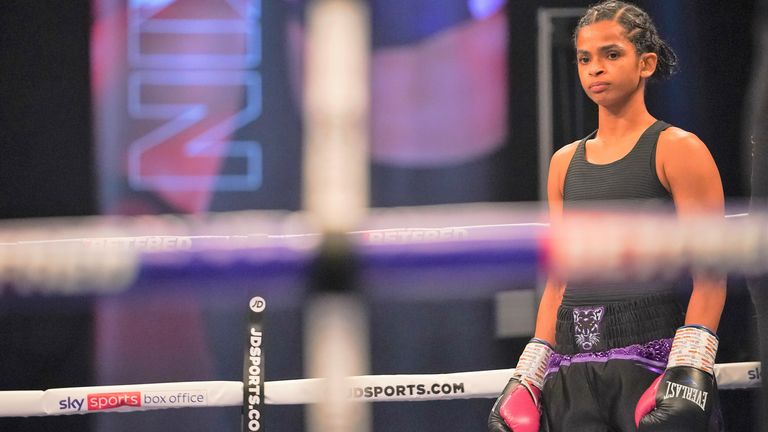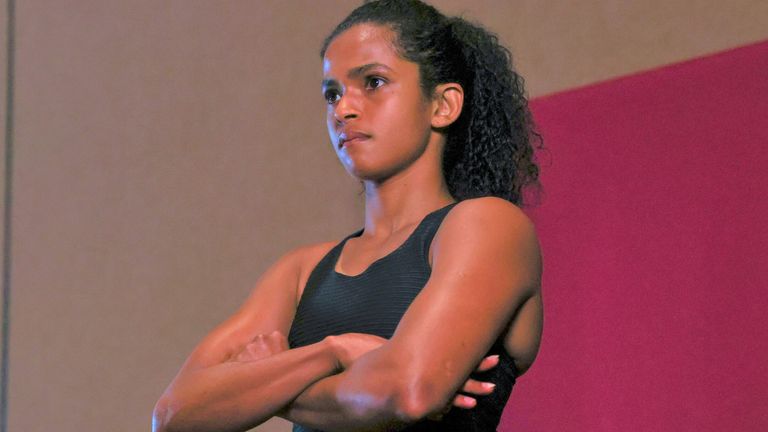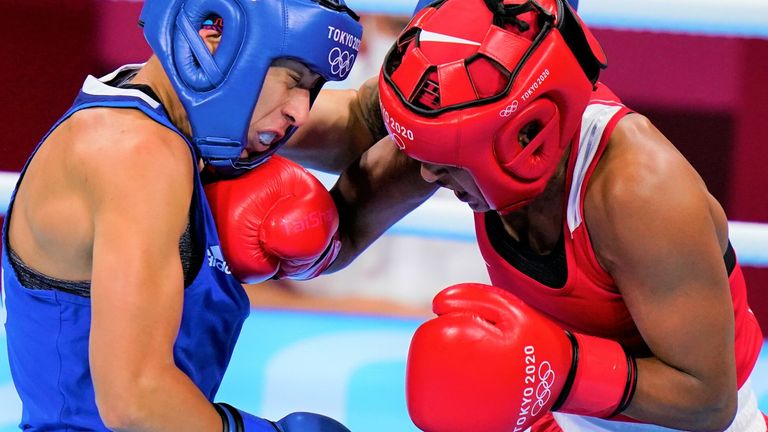Ramla Ali tells Sky Sports about challenging build-up to historic Olympic bout for Somalia in Tokyo
"If I can inspire another 12-year-old me coming up, who wants to not just box but take sport seriously, then I feel like I've done something good"; Ramla Ali reflects on her historic fight at the Tokyo Olympics
Saturday 28 August 2021 16:36, UK
If you're going to greet Ramla Ali with repetitive questions about her last fight, then you should stop and listen to a stinging account about making history for Somalia.
Ramla Ali's name is now in the history books as the first Somali boxer to compete at the Olympic Games, but that statistic should come with an asterisk*.
*More details needed.
Speaking to Sky Sports, a few weeks after her return from Tokyo, Ali said: "A lot of people were asking me: 'How did it go? How was the experience? What was it like?'"
But she couldn't simply respond by saying, 'It was challenging, it was inspirational, or it was frustrating'. It was much more than that.
"The one thing that I've said to everyone is that the African Olympic experience is 100 per cent different to the western Olympic experience," Ali told Sky Sports.
"When I first started competing for Somalia, I knew what I was getting myself into, so I can't really say, 'Oh my god, it was such a shock!'
"In the last four, five years that I've competed for Somalia, I haven't received a single penny of funding."
Ali combines her boxing career with modelling.
Both industries have conflicting requirements, with Ali even revealing that a photo shoot could have been jeopardised after she had sustained a gaping cut while outclassing a heavier opponent.
But without modelling, Ali wouldn't have made it to Japan.
A lot of people say, 'Bloody hell, you're modelling a lot'. But I have to, because one job helps pay for a tournament.
"Two days before going out to Tokyo, I was on a 12-hour shift working so I could pay to get myself out there.
"That was really hard because you're going to the Olympics and you're competing with full-time athletes.
"Even the people who see me training all the time, I wouldn't necessarily call myself a full-time athlete."
Ali did not have the financial support afforded to Team GB's Boxing squad, who returned with a record six-medal haul.
"I don't think it's a level playing field, no," she said.
"You're asking athletes who are not full-time [to compete].
"One of the Ghanaian boxers, he's a chicken herder. That's his job full-time, that's what he uses to pay his way to box."
Her promising professional career, with a three-fight unbeaten record was put on hold while Ali attempted to break sporting boundaries for Somalia.
But any hopes of securing an Olympic medal were severely hindered after she was only informed of her inclusion in the Games with five weeks to go.
"There's incompetency," admitted Ali.
"When you're incompetent, that 100 per cent ruins people's chances."
Ali had to drastically alter her style, attempting to score points with a rapid punch output, rather than breaking an opponent's resistance with strategic combinations.
"I know a lot of people will say, 'Five weeks is plenty of time, especially if you've just come off a fight and X, Y and Z.
"But for me, amateur boxing and professional boxing are two completely different sports. Five weeks is just not enough time to just make that adjustment, especially since it took me 18 months to make the adjustment of going into the pros.
"Going into my fight, I was taken aback by the pace. I wasn't used to it, having fought as a pro for the last 18 months."
Romania's Claudia Nechita had no such concerns, having paced herself for the Games with years of amateur bouts, and she edged out Ali on points after three frenetic rounds.
Without financial backing, or support staff, Ali had still attained a long-term aim and she hopes to empower young athletes from her home country.
"There is 100 per cent a sense of pride.
"All the Somali youths, the women and men that have supported me over the last couple of years, who were always posting positive things on my Instagram and saying how proud they are of me and saying a loss doesn't matter, let's move forward, and things like that. This was for them.
"If I can inspire another 12-year-old me coming up, who wants to not just box but take sport seriously, then I feel like I've done something good."
Ali is signed to Anthony Joshua's 258 management label and an appearance on the same bill as the world heavyweight champion is another ambition that she hopes to fulfil in the future.
Whilst preparing for her return to the professional scene, Ali is also dedicated to developing The Sisters Club initiative, a female-only self-defence class.
"I started it in 2018, and it was primarily meant for religious minorities who don't necessarily get access to sport in London.
"I know everyone can walk into a gym and start training, but most of these women are religious and they don't really want to be in spaces that are dominated by men.
"Over time, ethnic minorities started walking in and women who have suffered from domestic violence and domestic abuse. Sisters Club just grew and grew.
"We're going to try and expand it across England and see if we can open as many classes as possible. That's the end goal.
"It's a free class, open to all women, so it's not excluding anyone. Any woman can train and learn how to box, learn self-defence, and just feel like they can walk safely around their city at night."






